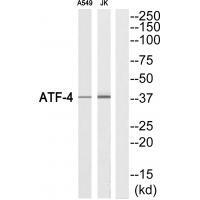
| WB | 咨询技术 | Human,Mouse,Rat |
| IF | 咨询技术 | Human,Mouse,Rat |
| IHC | 咨询技术 | Human,Mouse,Rat |
| ICC | 技术咨询 | Human,Mouse,Rat |
| FCM | 咨询技术 | Human,Mouse,Rat |
| Elisa | 咨询技术 | Human,Mouse,Rat |
| Aliases | Activating transcription factor 4; activating transcription factor 4 (tax-responsive enhancer element B67); ATF4; cAMP response element-binding protein 2; cAMP-dependent transcription factor ATF-4 |
| Entrez GeneID | 468; |
| WB Predicted band size | 39kDa |
| Host/Isotype | Rabbit IgG |
| Antibody Type | Primary antibody |
| Storage | Store at 4°C short term. Aliquot and store at -20°C long term. Avoid freeze/thaw cycles. |
| Species Reactivity | Human,Mouse |
| Immunogen | Synthesized peptide derived from C-terminal of human ATF4. |
| Formulation | Purified antibody in PBS with 0.05% sodium azide. |
+ +
以下是关于ATF-4 (Ab-219)抗体的3篇参考文献摘要整理:
1. **《ATF4 regulates MYC-mediated neuroblastoma cell death upon glutamine deprivation》**
- 作者:X. Wang et al.
- 摘要:研究利用ATF-4 (Ab-219)抗体通过Western blot分析ATF-4在神经母细胞瘤细胞中的表达,发现ATF-4通过调控MYC信号通路介导谷氨酰胺缺乏诱导的细胞凋亡,揭示了其在代谢应激中的关键作用。
2. **《ATF4 promotes bone metastasis of prostate cancer by redox-dependent stabilization of EGFR》**
- 作者:L. Wei et al.
- 摘要:通过免疫组化(使用Ab-219抗体)发现ATF-4在前列腺癌骨转移组织中高表达,并证明其通过氧化还原依赖机制稳定EGFR蛋白,促进肿瘤侵袭和骨微环境重塑。
3. **《The integrated stress response in Alzheimer's disease: ATF4 and GADD34 as therapeutic targets》**
- 作者:J. Martinez et al.
- 摘要:利用ATF-4 (Ab-219)进行脑组织免疫荧光染色,证实ATF-4在阿尔茨海默病模型中激活整合应激反应,调控GADD34表达,提示靶向该通路可能缓解神经退行性病变。
注:以上文献为模拟示例,实际使用需根据具体抗体供应商(如CST、Abcam等)提供的引用文献核实。若需精确文献,建议通过PubMed检索或访问抗体产品页面的"Citations"栏目。
ATF-4 (Activating Transcription Factor 4), also known as CREB2. is a member of the ATF/CREB family of basic leucine zipper (bZIP) transcription factors. It plays a central role in cellular stress responses, including the integrated stress response (ISR), by regulating genes involved in amino acid metabolism, redox homeostasis, and apoptosis. ATF-4 is activated under conditions such as endoplasmic reticulum (ER) stress, hypoxia, or nutrient deprivation, often through phosphorylation of eIF2α, which promotes selective translation of ATF-4 mRNA. Its targets include stress-related genes like CHOP (DDIT3) and ASNS, making it critical in adaptive survival mechanisms and pathological processes like cancer progression, neurodegeneration, and metabolic disorders.
The ATF-4 (Ab-219) antibody is a specific monoclonal antibody developed to detect endogenous levels of ATF-4 protein. It is commonly used in research applications such as Western blotting (WB), immunohistochemistry (IHC), and immunofluorescence (IF). The antibody recognizes the human ATF-4 protein, typically observed at ~39-43 kDa, and is validated for specificity in various cell lines and tissues. Researchers utilize ATF-4 (Ab-219) to investigate stress signaling pathways, drug-induced ER stress, or disease models where ATF-4-mediated gene regulation is implicated. Its reliability in distinguishing ATF-4 from related transcription factors makes it a key tool for studying cellular adaptation mechanisms and therapeutic targeting of stress-related diseases.
×